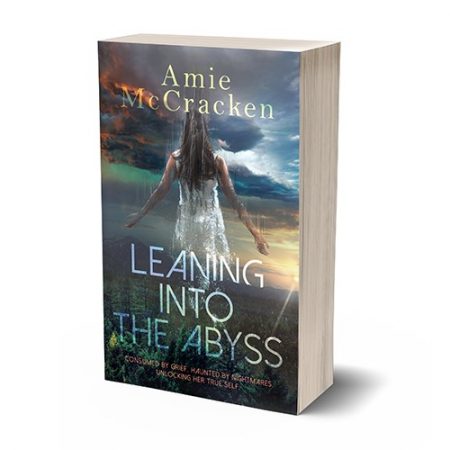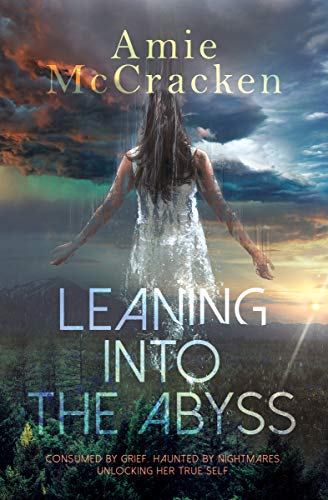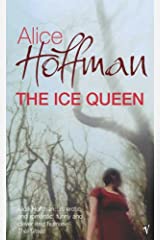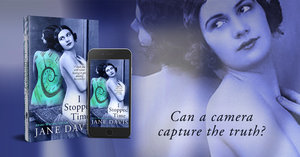I’m delighted to welcome Amie McCracken to Virtual Book Club, my author interview series which gives authors the opportunity to pitch their books to your book club, be it virtual or real.
Amie McCracken edits and typesets novels for self-published authors and helps writers polish their work. She describes herself as an imaginist, with a lot of ideas floating around in her head and a long list of places still to visit. She’s been swimming in books her whole life, therefore having a career as an editor and book designer was only natural. There’s always a book or three on her nightstand and a manuscript in progress on her laptop. There’s also a possibility she might be addicted to tea (something I’m also guilty of).
Q: Amie, can I start by asking what it is about Leaning into the Abyss that you feel makes it particularly suitable for book clubs?
Books offer us a deep dive into what if. Leaning Into the Abyss takes it one step further and introduces the idea of choose your own adventure. It shows us two different paths that look completely different but were formed from the same person. It asks, what if your life were to change drastically from one moment to the next? Would you be the same person? And I think book clubs are best when they force you to reflect on your own situation. Rhea’s story should get the gears turning on what your own life would look like in her shoes.

Q: Please tell us how you came to be a writer.
I have always been intrigued by stories. Even back when I was two and couldn’t read, I would “read” books to my stuffed animals. But I think being a reader and wanting to discover how someone could use a turn of phrase to make me cry or make me want to throw the book at the wall—that was what pulled me into the world of writing. I enjoy the nuance of each and every idea, not necessarily the story as a whole, which is why I’m drawn to magical realism and the beauty of each sentence in and of itself.
Q: Is your day job a distraction or does it add another element to your writing?
I work as an editor and book designer, so I am always swimming in the written word. At times it hinders my writing because I can be too analytical and can’t let the creativity flow. Other times I find that I have the skills to do more than I thought I was capable of, simply because I spend so much time immersed in stories. And of course, as a freelancer, I always have an excuse to be working instead of writing. The writing falls to the wayside a lot, but I am a self-motivated person so manage to get it done without too much prodding or procrastination.
Q: What you said about being too analytical blocking creativity really resonates with me. Lets turn to the book – and I have to say that I love the cover! So much so that I’m going to post it again.

The blurb…
My husband died on our wedding day. Fell off a cliff while my best friend Luke watched. I plummeted into a world of nightmares, a hurricane of my in-laws’ demands for his grandmother’s ring and other things that didn’t belong to them. A deep and murky pool threatened to drown me in memories of my mother, who died when I was a teenager. Since then my sister Phoebe had mothered me, and her continued control of my life drove a wedge between us. My still-grieving father dissipated even further into the background. And Luke, who had always been my rock, vanished in his own pain.
I knew I had to break the surface. I knew I had to learn to open myself to possibility. To sift through the dreams I had bottled up long before I met Andrew. There was a facet of myself that craved a more meaningful life, but it meant leaving the people I loved. Could I ride the tide of grief and rediscover the paths before me? Would I ever be my own person? Or would I simply stop swimming and sink?
Q. I’m already hooked. Did you know where the plot was going to go right from the start?
Absolutely not. I had the initial concept—a groom dying just before his wedding—since day one. But the first draft I wrote followed the five stages of grief in chronological order. It was incredibly repetitive and Rhea, my main character, didn’t have any growth through the story. She stagnated in her grief. I had also inserted magical realism elements that didn’t fit the story. They existed because I wanted them but not because they were authentic or had a purpose.
This new version hops around within the grief stages, as is truly natural to the grief process, and also utilises the magic in a way that affects Rhea and her emotional growth.
In fact, I received some feedback from a very good friend on the first draft that was harsh—true but still hard to swallow. I put the piece in a drawer, thinking it would be for good. But it just wouldn’t let me go. That bride who lost her groom wanted to tell me her story. I finally gave in and listened to her, reworked the entire thing, and found the heart of the story in Rhea’s dreams and nightmares.
Q: You’ve mentioned your main character Rhea. Do you have a method for creating characters’ names and what do you think makes a name believable?
My character names always have hidden meaning. I don’t lay out the background within the novels, but I think that by having intentional names you import those characters with more flavour right away. Rhea and her sister Phoebe are named after moons of Saturn because their mother was an astrophysicist. She died when they were teenagers, so the connection to her is incredibly important to their identities. I also named Rhea’s children, in the secondary timeline, Orion and Luna, for the same purpose.
My antagonists’ names are Hurakan (a Mayan storm god) and Dolores (sorrows in Spanish). They are the parents of the dead groom and play a major role in Rhea’s nightmares. They tend to come with bad weather and are rather frightening at times.
I like to find other connections within a story, or create them, as well. I found out once I had finished the draft with seventeen chapters that the number itself has a lot of pertinent meaning for my story. In the tarot deck, the star card (XVII) can indicate immortality. It could not be more obvious that my story is one of death and grief and rebirth.

Q: How do you make your readers regret that they’re coming to the end?
One of my favourite books of all time is Beauty by Robin McKinley. It’s not the most lauded book out there; it hasn’t won awards; it’s even a retelling of another story. But what keeps me coming back to it is that by the last page, I am so invested in the characters and so in love with their world, that I want to close the book and turn right back to page one immediately. It’s not the words on the page that do that, it’s the way it makes me feel. So my intention with my book is to give that sense of hope in Rhea’s story, that she has avenues opening up before her that intrigue the reader and make them want to know more. I whet their appetite for something fresh and new and hope that they leave feeling satisfied but also slightly disappointed that they can’t stay in her world just one chapter more.
Q: Was your novel inspired by any real life events? And, if so, how do you deal with the responsibility that comes with this?
I have taken a small part of a true story and expanded on it. The origin comes from a story near my home town, one that my dad told me about, of a groom at his bachelor party being put in the trunk of a car for fun. When his friends opened the trunk after a short drive, he had asphyxiated on his own vomit. It’s an incredibly gruesome and sad story. I feel very deeply for anyone involved in a situation like that. My imagination simply wouldn’t let go of how the bride would handle news like that. I was curious to understand her plight.
It’s that exploration of a seed of an idea that all books are born from, so I would assume that most books have a kernel of truth to them. Mine just has a beginning that I can pinpoint as real life.
Q: After writing three novels (among a novella, short stories, and a non-fiction), how do you come up with ideas for new ones?
I’m actually stuck on this right now. So far I have written all of my books with the next idea always ahead of me. But now I’ve finished and I don’t have a new idea. In some ways it’s exciting because there is a smorgasbord to choose from, but that also feels intimidating and limiting. I need pointing in the right direction and then I can get down to work, but having any and every possibility available makes me freeze. I’m playing with a few ideas right now, and working on a memoir as well as a non-fiction, but I don’t have a solid plan for the next novel. There will certainly be another one. I can’t break my streak of having published a book each year for the past five!
Q: Have you ever found that a book you were reading was influencing your writing style?
Most definitely. In fact, after publishing this one, I started rereading The Ice Queen by Alice Hoffman because it is a book I would put on the shelf next to mine in similar genre and writing style. But it was shocking to read the line “The man who stumbles off a cliff on his wedding day” on the second page. I think everyone is heavily influenced by everything around them. I don’t think it is negative, either. We don’t live in a vacuum. We are doing nothing other than honouring the things we love if we emulate them.

Q: David Chabon wrote: “The truth of a dream is not in its dreamlike quality: the truth of a dream is a night truth oozing through into the waking world, unseen not because of our vanity or self-delusion or fear but because we spend so much of our waking lives sleepwalking.” Do you keep a notebook by your bed? And if so do you censor its contents by daylight?
This idea fascinates me, and of course it is a large theme in my book. The idea that dreams and nightmares can be real, can come to life, probably do. My son, who is five, still has that childlike view of the world. His imagination runs away with him, and there are nights when he can’t sleep for fear of the things hiding in the dark corners of his room. I have always said that I don’t understand how Stephen King sleeps. Imagination is a powerful thing, and of course I keep a notebook by my bed and record what comes in the sleepy moments of wakefulness, without censorship I hope, though words never do dreams true justice. It is in that translation that I feel inadequate.
Q: Are you looking to entertain or illuminate with your writing?
Illuminate through entertainment. I think that we can learn a lot from fiction. In fact, I think learning from fiction rather than fact allows us to learn exactly what we need in that moment rather than being told what to learn. This is why rereading favourite books is important. There is more information in one book than can be gleaned in one reading, not to mention that at different times in your life you will extract different aspects to fit your current situation.
Want to know more about Amie and her work?
For details of professional services visit her website.
Click here for details of where to buy Leaning Into the Abyss.
Follow her on Twitter https://twitter.com/amiemccracken
Find her on Facebook
To have future posts delivered directly to your in-box, visit the sidebar on the right and subscribe to my blog, or to find out about new releases, competitions and freebies, subscribe to my newsletter and I will send you a free copy of my novel, I Stopped Time, as a thank you.
While I have your attention, can I please draw your attention to my updated Privacy Policy. (You may have noticed, they’re all the rage.) I hope this will reassure you that I take your privacy seriously.
Remember, if you enjoyed this post please share it.
If you have subscribed to my blog but no longer wish to receive these posts, simply reply with the subject-line ‘UNSUBSCRIBE’ and I will delete you from my list.



